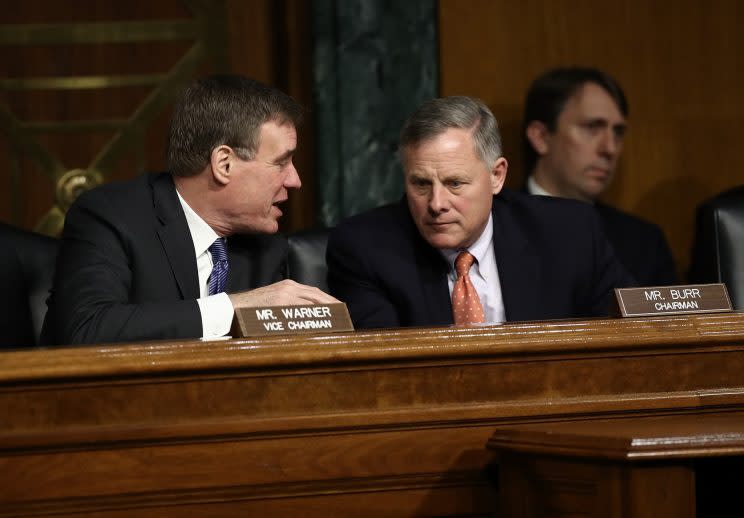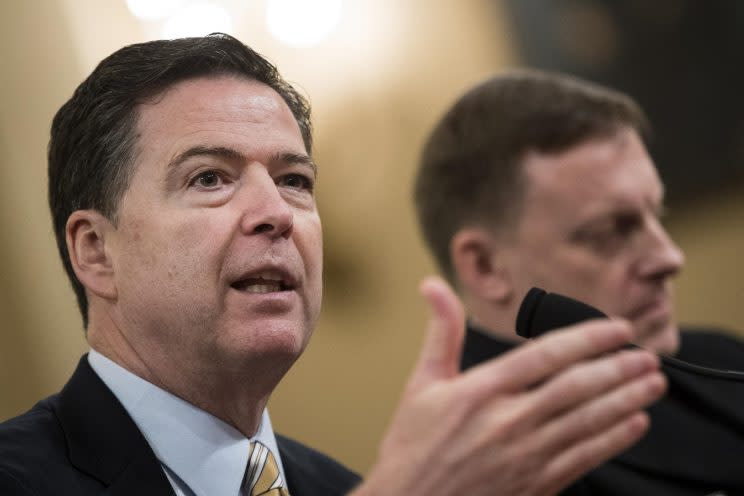Senate Russia probe flounders amid partisan bickering

More than three months after the Senate Intelligence Committee launched its investigation into Russian meddling in the 2016 election — including allegations of collusion by associates of President Trump — the panel has made little progress and is increasingly stymied by partisan divisions that are jeopardizing the future of the inquiry, according to multiple sources involved in the probe.
The committee has yet to issue a single subpoena for documents or interview any key witnesses who are central to the probe, the sources said. It also hasn’t requested potentially crucial evidence — such as the emails, memos and phone records of the Trump campaign — in part because the panel’s chairman, Sen. Richard Burr, R-N.C., has so far failed to respond to requests from the panel’s Democrats to sign letters doing so, the sources said.
“The wheels seem to be turning more slowly than the importance of the inquiry would indicate,” said Richard Ben-Veniste, a member of the 9/11 commission and former Watergate prosecutor, one of a number of veteran Washington investigators who have begun to question the lack of movement in the probe.
As Congress returns from its spring recess this week and Trump approaches his 100th day in office, the panel has no further public hearings scheduled, even as the House Intelligence Committee — torn by its own partisan wrangling and internal turmoil — shows some flickering new signs of life. The result has caused growing frustration among the Senate committee’s Democrats, who are privately complaining the probe is underfunded, understaffed and too timid in pushing to get to the bottom of one of the most explosive political stories in years.
“I would like to see this moving more quickly,” Sen. Martin Heinrich, D-N.M., a member of the panel, said in an interview with Yahoo News.
Sen. Mark Warner, D-Va., the ranking minority member on the panel, has repeatedly said the Russia investigation “may very well be the most important thing I do in my public life.” And until now, Warner has sought to project an appearance of bipartisan unity with Burr, portraying the probe as a methodical inquiry that will follow the facts wherever they lead.
But Warner’s handling of the probe has led to grumbling among some of his Democratic colleagues that he has been too reluctant to challenge Burr and press for more aggressive action — for fear of undercutting the perception that he and the Republican chairman are working cooperatively together. “He’s been afraid to even bring up the S-word,” said one source familiar with the details of the investigation, referring to the panel’s authority to issue subpoenas for documents.
There are signs Warner’s patience is starting to wear thin. Warner “is not satisfied with the pace of the investigation and he doesn’t think it’s moving fast enough,” a committee source tells Yahoo News. “He would like to have seen more hearings and more interviews with witnesses.”
Asked for comment, Rebecca Watkins, chief spokesperson for Burr, emailed: “We won’t have any comment on internal committee processes.”

The state of the Senate probe is considered especially significant because in the view of many observers it holds the only hope for a public resolution of the swirl of allegations about Russian interference in the election and its aftermath that have dominated the headlines for months. Those allegations led to the dismissal of Trump’s first national security adviser, retired Lt. Gen. Michael Flynn, the recusal of Attorney General Jeff Sessions from campaign-related investigations and the sidelining of House Intelligence Committee Chair Devin Nunes (now being investigated himself by the House Ethics Committee over accusations that he improperly disclosed classified information in an effort to give credibility to Trump’s tweets accusing former President Barack Obama of “wiretapping” him, without evidence).
For Democrats, some of the information that has come to light — almost entirely from media reports — points to a concerted effort by Trump and his associates to conceal secret ties to Moscow. Flynn and Sessions both had undisclosed meetings last year with the Russian ambassador, Sergei Kislyak, and, in Flynn’s case, discussed the possible lifting of Obama-era sanctions once Trump took office. The FBI was concerned enough about one former Trump foreign policy adviser, Carter Page, to obtain a Foreign Intelligence Surveillance Court warrant to monitor his communications on the grounds he might be an “agent of a foreign power.”
The White House and Trump’s allies insist no clear evidence of actual collusion between the Trump campaign and the Kremlin has actually surfaced — and never will. “How many people have to say there’s nothing there before you realize there’s nothing there?” said White House press secretary Sean Spicer, in one of his many public comments dismissing questions about the investigations.
But how and when the conflicting versions of events will ever be resolved is far from clear. As first disclosed last month by FBI director James Comey, the bureau has an ongoing counterintelligence investigation into the Russian “influence campaign” in the 2016 election — including possible involvement of associates of Trump. But that probe has been going on since last July and is likely to continue for some time, possibly even years, with the results never becoming public (most such counterintelligence inquiries never do) — unless it eventually morphs into a criminal investigation that leads to federal charges, far from a certainty.
Meanwhile, the House investigation seemed to have broken down after Nunes was forced to step aside. Last Friday, however, the committee, now under the leadership of Rep. Mike Conaway, R-Texas, announced that it had asked Comey and NSA Director Adm. Mike Rogers to appear at a closed hearing on May 2. It also is seeking to reschedule a previously planned public hearing with former Deputy Attorney General Sally Yates, and she is expected to be grilled about warnings she gave White House counsel Don McGahn that Flynn had misrepresented a conversation he had with Kislyak on Dec. 29, the day then President Obama announced new sanctions against Russia, causing Vice President Mike Pence and others to give false accounts to the news media. (The panel is at the same time asking for public testimony from former Director of National Intelligence James Clapper and former CIA Director John Brennan.)
“It’s the first step for us getting back on track,” Rep. Eric Swalwell, D-Calif., a member of the House panel, said about the committee’s request for testimony. “It’s the least we can do to regain our credibility.”

But behind the scenes, while suffering none of the public embarrassments of the House inquiry, the Senate probe has been fraught with its own conflicts. Initially, its progress was stalled because it took weeks to work out an agreement with CIA Director Mike Pompeo and other U.S. intelligence community officials to provide Senate committee staffers access to “raw intelligence” documents that formed the basis for the Jan. 6 “assessment” that Russian president Vladimir Putin authorized a multifaceted campaign during the 2016 election to sew distrust among the American electorate, discredit Hillary Clinton and boost the chances of Trump, sources said.
The issue was finally worked out, but only a limited number of staffers assigned to the probe were allowed to review the thousands of pages of material: three Republican and two Democratic aides, plus the respective staff directors for each party, both of whom had other standard oversight duties. (Of the two Democrats assigned by Warner to the probe, one was a junior staffer who is also going to law school; another Democratic investigator has since been hired and is expected to begin work next month, a committee source said.)
The limited access infuriated some senators, notably Sen. Ron Wyden, D-Ore., who demanded that their intelligence committee aides also be given the opportunity to review the same material. But Burr, who has long feuded with Wyden, refused to go along, resulting in a standoff that has badly divided the committee.
That standoff has spilled over into other areas. The committee early on sent letters to key witnesses — such as Flynn, Page, former campaign manager Paul Manafort and longtime Trump adviser Roger Stone — to preserve all documents that might be relevant to the investigation. One such letter was also sent to White House counsel McGahn, who previously served as chief counsel to the Trump campaign and has authority over its records.
But the committee has still not sent any follow up letters even asking for their documents — much less issued a subpoena demanding they be turned over. Although letters requesting the material were drafted by Democratic staffers, Burr has so far declined to sign them, leaving the panel’s investigators powerless to review key material necessary to pursue the issues of possible collusion.
Moreover, the committee also hasn’t even approached potentially key witnesses to schedule interviews with them. Manafort, Stone and Page have all publicly volunteered to be questioned by the committee staff. But so far, the committee seems stuck in a version of Catch-22: It has yet to follow up on those offers, in large part because it doesn’t want to interview them until it has reviewed their documents and emails, which the committee hasn’t asked for. (Flynn, through his lawyer, also has offered to talk but only until he first receives immunity — a step the committee is in no rush to even consider.)
So what has the committee been doing for three months? The five staffers assigned to the case have been methodically reviewing the classified raw intelligence documents that formed the basis for the Jan. 6 assessment — and that, in turn, has lead to the discovery of more documents that are potentially relevant, sources say. It also has compiled a lengthy witness list that staffers have begun to winnow down.
But some veteran Washington investigators say the committee is frittering away one of its most important assets — a sense that is aggressively moving to get to the truth.
“It’s important to show some momentum and appear to have some momentum,” said Michael Bromwich, a former federal prosecutor who participated in the Iran-Contra investigation and later served as Justice Department inspector general. “If there’s radio silence for a few months, you lose a valuable asset.”
Read more from Yahoo News:
? ‘Judge sitting on an island’: Sessions dismisses Hawaii court’s travel ban ruling
? Trump says Iran not living up to ‘spirit’ of nuclear deal
? Government shutdown deadline looms as Republicans return to Washington
? Trump bemoans ‘ridiculous standard’ of judging presidents by first 100 days
? Photos: March for Science events around the globe


